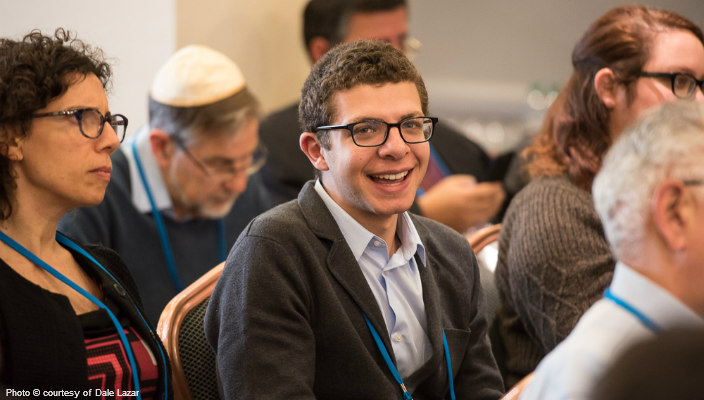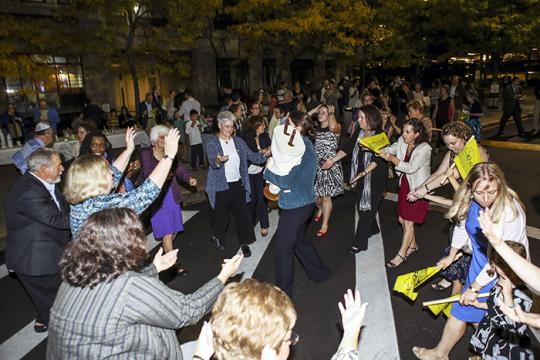Focusing on Young Leadership: Fifteen Minutes with Jewish Leader Andrew Keene

Milwaukee native Andrew Keene, a new executive board member of the World Union for Progressive Judaism (WUPJ), was recently elected to co-chair its upcoming CONNECTIONS 2017 biennial in Israel. He's no stranger to lay leadership, having served as North American president of of NFTY from 2013-14 (he's still an active alumnus) and as a current trustee of the Union for Reform Judaism. This spring, Keene, an entrepreneurship student at Drexel University in Philadelphia, traveled halfway around the globe – to Israel, London, and several stops in between – to attend seminars, meet-ups, and biennials along the way.
We caught up with Keene to talk about going global, being engaged, and serving as a young lay leader - and why it’s all so important.
WUPJ: Your trip started in Israel, where you represented the U.S. at a major convening of global Jewish leaders. Tell us about that.
Andrew Keene: TaMaR is the WUPJ’s young adult movement, connecting progressive Jewish leaders in their 20s and 30s from nearly every continent. The group included graduate students, future rabbis, legal professionals, and government analysts. At a time in their lives when many people are exclusively career-focused, these young people takes pride in both their career aspirations and their Jewish identity – and is eager to identify how the two can meaningfully intersect.
I also met with participants in Shnat Netzer, a ten-month Jewish leadership training program. This brilliant group is spending a year in Israel between high school and university, steeping themselves in Progressive Jewish values and ideology and deepening their own Jewish identity. They, too, are preparing to go back and be leaders in their Jewish communities at home.
What were your takeaways from these experiences?
The challenges of local Jewish communities are global. While local or regional characteristics and challenges might be unique, we have lots to collaborate on with our global counterparts. We have lots to learn from each other: best practices to share, challenges to overcome together, and successes to celebrate.
I’m eager to convene a larger group of young, progressive Jewish leaders to think big for our collective future, so I’m looking for the platforms, opportunities, and individuals who can be partners in convening more diverse groups like this, both in person and virtually. I’m also really looking forward to CONNECTIONS 2017, the WUPJ Biennial Conference in Jerusalem next May. More on that in a minute!
You were recently appointed to the executive board of the World Union for Progressive Judaism. What were the highlights of their recent biennial?
I started my term on the executive board last May at our conference in Rio de Janeiro. During the opening ceremony, one of the local progressive communities in Rio passed a Torah scroll to a young congregation, Kehillat Shanghai in China. The passing of this Torah scroll was the physical embodiment of what it means to be active participants in a global movement. With that Torah follows a new sense of inspiration, deep learning, and symbol of growth. Moments like this show that Progressive Judaism is alive, vibrant, growing, and globally connected.
As the week ended, you joined board meetings with the WUPJ, including the announcement that you will be co-chairing its upcoming biennial in Israel. What can we look forward to from the conference?
We recently concluded our seders with “Next year in Jerusalem,” and CONNECTIONS 2017 offers the opportunity to actualize that ideal. This conference will bring Progressive Jews from every corner of the Diaspora to Israel to highlight, celebrate, and challenge practices and values in the Jewish homeland – and it will conclude the 90th anniversary celebration of the WUPJ, which began in London, where the organization was founded in 1926.
We’re working hard to build an exciting experience that lives up to the conference name, “Connections.” In addition to providing meaningful opportunities to connect with old friends, we want every delegate to feel part of an ongoing dialogue that addresses the challenges and opportunities facing our movement. We will also be capitalizing on our presence in Israel and making our voices heard as a force of progress in Israeli law, culture, and society – so come to Jerusalem ready to be inspired and to leave with an enhanced network of motivated partners in our shared work.
How would you advise young adults interested in being involved like you – juggling career and leadership roles?
I see part of my role as connecting my peers with the right people and resources to catalyze and enable peer-led projects and initiatives in our Jewish communities. As a student, a professional, and a lay leader, each day is a balance of furthering a career and, at the same time, volunteering the same skills for the WUPJ. Both are important to me, and many of my peers are in similar situations – balancing passions, careers, community involvement, and Jewish identity building.
Most of us have the capacity to be leaders in the Jewish community in one way or another. Meaningful Jewish leadership doesn’t need to carry a board title or have meeting obligations; it’s just as important to get involved on a local level. But if you’re looking to do something on a larger scale, know that there’s a global Progressive movement open to your involvement and support.
Have something to say about this post? Join the conversation in The Tent, the social network for congregational leaders of the Reform Movement. You can also tweet us or tell us how you feel on Facebook.
Related Posts

A Shabbat Message

URJ and Israel: Post-October 7th Updates and Resources

